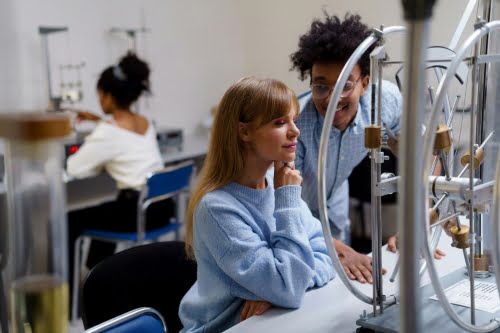1. Practice Assignments
Practice assignments are fundamental in education as they provide students with opportunities to reinforce and consolidate concepts learned in class. These types of homework assignments typically involve repetitive exercises aimed at mastery and proficiency. Here’s a comprehensive exploration of practice assignments:
Importance and Benefits:
Practice assignments play a crucial role in the learning process by solidifying understanding through repetition. They help students internalize new information, develop fluency in skills, and identify areas that need improvement. Through practice, students gain confidence in applying theoretical knowledge to practical problems.
Examples and Practical Applications:
- Mathematics: Solving math problem sets to reinforce concepts like algebraic equations, geometry theorems, or calculus principles.
- Language Arts: Completing grammar exercises to improve writing skills, such as punctuation, sentence structure, and verb tenses.
- Science: Conducting lab experiments to apply scientific principles learned in class, such as testing hypotheses or observing chemical reactions.
- Foreign Languages: Practicing vocabulary quizzes and dialogues to enhance language fluency and communication skills.
Role in Academic Growth:
Practice assignments help bridge the gap between theory and application. By engaging in repetitive tasks, students not only strengthen their understanding but also build retention and automaticity in skills. This foundational practice prepares students for more complex challenges in higher education and beyond.
2. Research-Based Assignments
Research-based assignments require students to gather information, analyze data, and present their findings. These assignments foster critical thinking, research skills, and effective communication. Let’s explore the intricacies of research-based assignments:
Importance and Benefits:
Research-based assignments encourage students to delve deeper into topics, explore multiple perspectives, and develop their analytical capabilities. They promote independent inquiry, evidence-based reasoning, and the ability to synthesize information from various sources.
Examples and Practical Applications:
- History: Writing an essay that analyzes different historical interpretations of a significant event.
- Science: Conducting a research project on a scientific phenomenon, gathering data through experiments, and presenting findings in a structured report.
- Social Sciences: Studying demographic trends, collecting survey data, and analyzing results to draw conclusions about societal changes.
- Literature: Researching literary criticism to support interpretations of a novel or play in an academic paper.
Role in Academic Growth:
Research-based assignments cultivate skills essential for academic success and professional development. Students learn how to formulate research questions, locate credible sources, evaluate evidence, and construct coherent arguments. These assignments also prepare students for future academic endeavors and careers that require strong research and analytical abilities.
3. Creative Assignments
Creative assignments stimulate imagination, originality, and self-expression among students. These tasks encourage thinking outside the box and approaching assignments from innovative perspectives. Here’s a comprehensive look at creative assignments:
Importance and Benefits:
This foster a student’s ability to generate ideas, explore artistic expression, and problem-solve creatively. They promote innovation, emotional intelligence, and the development of unique talents and interests.
Examples and Practical Applications:
- Writing: Creating short stories, poetry, or personal narratives that explore themes like identity, resilience, or cultural diversity.
- Visual Arts: Designing artwork using various mediums such as painting, sculpture, or digital art to convey emotions or concepts.
- Multimedia: Producing videos, animations, or interactive presentations to illustrate historical events, scientific concepts, or literary analyses.
- Music and Performance Arts: Composing music pieces or performing theatrical interpretations that reflect social issues, historical events, or personal experiences.
Role in Academic Growth:
Creative assignments nurture skills that are increasingly valued in the modern workforce, such as creativity, innovation, and adaptability. They encourage students to think critically, solve problems creatively, and communicate ideas effectively through different mediums. These assignments also promote self-confidence and a deeper understanding of cultural and artistic expressions.
4. Problem-Solving Assignments
Problem-solving assignments challenge students to apply their knowledge to real-life situations or complex scenarios. These tasks require critical thinking, analytical reasoning, and practical application of learned concepts. Here’s an in-depth exploration of problem-solving assignments:
Importance and Benefits:
Problem-solving assignments develop students’ ability to analyze problems, formulate strategies, and implement solutions. They enhance cognitive skills, logical reasoning, and the capacity to tackle challenges across various disciplines and contexts.
Examples and Practical Applications:
- Mathematics: Solving real-world mathematical problems involving budgeting, geometry in architecture, or optimization in engineering.
- Sciences: Analyzing scientific data to propose solutions for environmental issues, medical research challenges, or technological innovations.
- Social Sciences: Applying historical knowledge to analyze and solve contemporary societal problems, such as understanding geopolitical conflicts or economic disparities.
- Computer Science: Developing algorithms, coding solutions, or designing software applications to address practical computing problems.
Role in Academic Growth:
Problem-solving assignments prepare students for real-world applications of their academic knowledge. They foster resilience, adaptability, and the ability to think critically under pressure. By engaging in problem-solving tasks, students develop practical skills that are essential for academic success, career readiness, and lifelong learning.
5. Reading Assignments
Reading assignments are designed to enhance students’ reading comprehension, critical analysis, and interpretation skills. These assignments expose students to diverse texts and genres while fostering a deeper understanding of content and context. Here’s an exploration of reading assignments:
Importance and Benefits:
Reading assignments promote literacy, broaden knowledge, and cultivate a habit of lifelong learning. They improve vocabulary, comprehension skills, and the ability to extract key information from written texts.
Examples and Practical Applications:
- Literature: Reading novels, plays, or poems to analyze themes, characters, and literary devices.
- Social Sciences: Studying academic articles, case studies, or research papers to understand theoretical concepts and empirical evidence.
- Science: Reviewing scientific journals, textbooks, or technical manuals to grasp scientific theories, methodologies, and experimental findings.
- Current Events: Reading newspapers, magazines, or online articles to stay informed about global issues, politics, economics, or environmental changes.
Role in Academic Growth:
Reading assignments enhance critical thinking and analytical skills by requiring students to engage deeply with written texts. They improve comprehension, interpretation, and the ability to evaluate information objectively. Reading widely across disciplines also prepares students for academic success by exposing them to diverse perspectives and expanding their knowledge base.
Conclusion
Homework assignments come in various forms, each serving a unique purpose in enhancing students’ academic growth and development. Practice assignments reinforce learning through repetition and skill mastery. Research-based assignments foster critical thinking, research skills, and effective communication. Creative assignments encourage innovation, imagination, and self-expression. Problem-solving assignments develop analytical reasoning, practical application, and resilience in tackling complex challenges. Reading assignments improve comprehension, critical analysis, and knowledge acquisition across diverse subjects.











